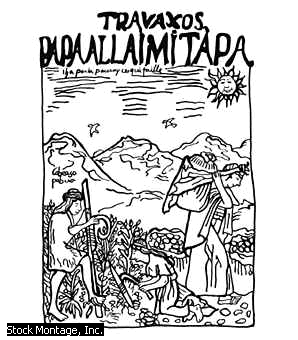| Home |
| Origins of the Quichua |
| The Inca Empire |
| Spanish Colonialism |
| Post-Independence |
| Current Movements |
| Bibliography |
| Ethnic Identities in Latin America |
|
|
The origins of the
Quichua language and the Quichua people (the various tribes which spoke
the language Quichua) is not entirely certain. Historical records from
the Andes during the pre-Inca era are incomplete and uncertain. It is known
that Quichua, also known as Quechua or Runa-Sumi, was spoken by some tribes
who were eventually incorporated into the Inca Empire before the Inca came
to power. One culture in the Andes believed to be responsible for the Quichua
language is the Tiahuanaco cultures who spoke both Quichua and another
similar language known as Colla. The Tiahuanaco are believed to have originally
believed to have spoken a primitive language that was a parent language
to both (Means 136). Quichua was spoken in several other tribes before
the rise of the Inca. The Wari culture based in Ayacucho is known to have
spoken Quichua.

The tribes that spoke Quichua before the rise of the Inca Empire had various different cultures and traditions. However, they all shared relatively similar characteristics such as similar religious customs and class structures (Peru 14). The Inca Empire became associated with the Quichua speaking people through their mutual animosity toward the neighboring tribe of the Chancas (Brundage 84). The Chancas would eventually be defeated by the Incas, with the help of Quichua speaking tribes. The When the Inca came to power, they had assimilated many tribes which spoke the language. It was known by nearly all the tribes in the ancient Peruvian Highlands and was the primary or only language of many of these tribes (Von Hagen 43). In 1438, the Inca emperor, Inca Pachacuti, mandated that Quichua become the language of the empire and required any official or administrator to know the language (Von Hagen 43). The Inca are largely responsible for the spread of the Quichua language and for its survival to this day.
An image of the traditional Quichuan method of harvesting
potatoes.
Works Consulted
Brundage, Burr Cartwright. Empire of the Inca. Norman, OK: University of Oklahoma Press, 1963.
Means, Philip Ainsworth. Ancient Civilizations of the Andes. New York: Gordian Press, Inc., 1964.
“Peru: The Resilience of Quechuan Culture…And Tongue.” UNESCO Sources No. 104 (9/1998): 14-15.
Von Hagen, Victor Wolfgang. Realm of the Incas. New York: New American Library, 1967.